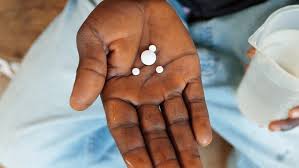Onchocerciasis
Onchocerciasis also known as river blindness, is a parasitic disease of the skin and eyes caused by the parasite Onchocerca volvulus. The name 'river blindness' is derived from the blacklyfly which transmits the parasite and breeds near fast-flowing streams and rivers. This is the reason why infection occurs most intensely in African villages near rapidly flowing streams. In addition to visual impairment, it can also lead to nodules under the skin.
It is the fourth leading cause of preventable blindness in the world with about 270,000 people becoming permanently blind worldwide every year. It mainly affects people living near rivers and fast moving streams. In Cameroon, it mainly affects those living in the North and Adamawa regions as well as around the rainforest.
Onchocerciasis is caused by a parasitic worm called Onchocerca volvulus which i transmitted by blackflies. The blackfly lands on your skin, and bites.If the blackfly had drunk the blood of another human being with river blindness and ingested some of the worms, it will then injecte worms into your body. The worms grow, and the adult worms live in your body. They can grow up to one meter long, and can live for up to 15-20 years in the body.
Adult worms form lumps under the skin. These lumps are most commonly found on the hips and shoulder blades. Female worms will then produce baby worms which migrate to parts of the body and if they get into your eyes, they can cause blindness. Other symptoms include;
- Disability
- Skin depigmentation
- Lesions
- Damaged immune system
- Blindness
- Skin itchiness
There is no definite treatment for onchocerciasis however a single dose of Ivermectin is used to kills the microfilaria rapidly and prevents the adult worm from producing any more microfilaria. However, once a person is blind they can't be cured, so precautions should be taken to avoid blackfly bites and seek medical advice if you feel you have been bitten.It is important however to note that, before ivermectin is used concomitant infection with Loa loa should be ruled out, as ivermectin may precipitate toxic encephalopathy in patients with this co-infection. Successful control of onchocerciasis has been hindered by these host reactions caused by presence of loa loa. For more information visit the page Loa loa.


